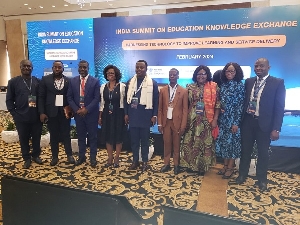A delegation from the Ministry of Education and its affiliated agencies led by the Deputy Minister of General Education, Rev. John Ntim Fordjour has arrived in India for the Education Knowledge Exchange Summit from February 14 to February 21, 2024.
Other delegates include Mamle Andrews, Chief Director of the Ministry of Education, Lawrence Sarpong, Deputy Registrar of the National Teaching Council of Ghana, David Prah, Deputy Director of Ghana TVET services, Edward Dogbe, Deputy Director for Statistics, and among others.
The Education Knowledge Summit titled “Harnessing Technology to Improve Learning and Service Delivery-Sharing Experiences from India” is supported by the World Bank under the Ghana Learning and Accountability Project.
The summit commenced with a series of presentations and panel discussions focusing on how technology is driving the education industry in various countries such as India, Ghana, Cameroon, Sierra Leone, and Burkina Faso.
The Deputy Director of Ghana TVET services, David Prah shared insights on the country's efforts to revamp the TVET sector under the leadership of the Minister for Education, Dr. Yaw Osei Adutwum.
He said the amalgamation of 11 sectors within the Ghana TVET service underscores a significant stride in unifying vocational and technical education across the nation.
He added the consolidation aims to streamline operations, optimize resource allocation, and enhance the overall effectiveness of TVET programs ultimately benefiting students and industries in Ghana.
Mr. Prah stressed the importance of technology in enhancing education services in Ghana and pointed out the joint efforts between the government and teaching unions, noting the distribution of over 290,000 laptops to teachers.
Additionally, he mentioned plans to provide computer tablets to all learners, indicating a dedicated approach to leveraging technology to improve educational outcomes nationwide.
The Ghanaian delegation articulated the policy framework underpinning technology-integrated education which was presented by Rev. John Ntim Fordjour.
Highlighting Ghana's ICT in education policy, Rev. Fordjour underscored its instrumental role in shaping educational practices.
He reiterated the National Teaching Council of Ghana's partnership with stakeholders, including the World Bank in training over 120,000 teachers in Digital Literacy to navigate the challenges posed by the COVID-19 pandemic.
He also outlined innovative content dissemination strategies such as I-Box Technology, Edmundo platforms, Ghana Learning Television, and Radio.
His concluding remarks emphasized Ghana's progressive stance with revisions to ICT in education policy encompassing artificial intelligence, robotics, and coding, which is aimed at equipping learners for the global workforce and advanced educational pursuits.
Despite commendable strides, the Deputy Minister acknowledged persisting challenges including connectivity constraints and insufficient budget allocations for ICT-enabled education.
The Education Knowledge Summit promises to promote more cooperation and mutual learning among participating nations.
The vibrant exchange of insights and experiences throughout the programme fosters collaborative synergies thereby improving Ghana's educational system and beyond.
Regional News of Monday, 19 February 2024
Source: Desmond Allotey-Pappoe, Contributor
Exploring global education innovations: Delegation from Ministry of Education attends education knowledge summit in India
Entertainment












